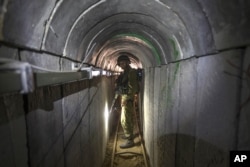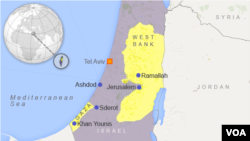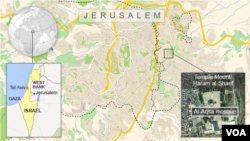U.N. Secretary-General Ban Ki-moon issued a strong call for a change in the status quo between Israelis and Palestinians, saying he is concerned they are reaching a point of no return for a two-state solution.
In an opinion article posted late Sunday on the website of The New York Times, Ban criticized Israeli occupation in the West Bank and what he called discriminatory policies that lead to the demolition of Palestinian homes.
"Keeping another people under indefinite occupation undermines the security and future of both Israelis and Palestinians," Ban wrote.
He said people "will always resist occupation," and that ignoring the frustrations of Palestinians will not make them disappear.
The U.N. chief condemned all terrorism and incitement of violence against Israeli civilians, but said security measures on their own will not stop future attacks.
"We continue to work with Israel and the Palestinian Authority to rebuild Gaza and prevent another devastating conflict, and to press Palestinians for genuine national reconciliation," Ban said. "Of course, a lasting agreement between Israel and Palestine will require difficult compromises by leaders and peoples on both sides."
He also called on Palestinians to immediately halt construction of tunnels in the Gaza Strip, which Hamas militants have used to smuggle in goods and stage attacks against Israelis.
Warns of attacks
Earlier Sunday, Israeli Prime Minister Benjamin Netanyahu said if Hamas carries out more tunnel attacks, Israel will retaliate with greater force than during the 50-day war in 2014 that killed more than 2,100 Palestinians, mostly civilians.
"I think that is understood in the region. It's understood in the world. I hope we won't need to do it but our abilities, both defensive and offensive, are developing rapidly and I wouldn't recommend anyone to try us," Netanyahu told a group of diplomats.
A top Hamas official boasted Friday that the group has built "twice the number of resistance tunnels" that were built during the war in Vietnam in the 1960s and '70s.
He said hundreds of Hamas members are working to build tunnels to free what he described as holy places, including the al-Aqsa mosque in East Jerusalem - a site Jews revere as the Temple Mount.
Israelis living near the border with the Gaza Strip have been complaining of underground drilling and construction noises near their homes.
Access to Ramallah Restricted
Meanwhile, Israel restricted access to the main Palestinian city of Ramallah on the West Bank Monday after another attack that wounded three Israeli soldiers.
Only residents of the city were allowed past checkpoints going in to the city while only foreigners, diplomats, and humanitarian cases were allowed out.
There were long lines at the checkpoints, where people complained of missing appointments, meetings, and other dates.
This was the first time in a long while that Israel partially sealed off a Palestinian city in reaction to violence.
A former bodyguard for the Palestinian attorney general opened fire on Israeli soldiers at a checkpoint near Ramallah Sunday, wounding three before he was shot dead.
A Palestinian police spokesman criticized Israeli Prime Minister Benjamin Netanyahu for punishing thousands over the act of one man.
But Netanyahu said Palestinian President Mahmoud Abbas has failed to speak out against an act of violence carried out by someone who worked for his own government.
Five months of Palestinian violence against Israelis has killed at least 25 Israelis while police and soldiers killed more than 150 Palestinians - most of whom were carrying out attacks or trying to.
Israel accuses Palestinian leaders of inciting the violence while Palestinians say they are sick of poverty, weak leadership, and a poor outlook for peace.
2014 conflict
Israeli forces bombarded Hamas and militant Palestinians in Gaza in the middle of 2014 in response to Palestinian rocket fire. About 70 Israeli soldiers and a handful of civilians were killed in the conflict.
Also, in a historic decision Sunday, the Israeli Cabinet approved a so-called egalitarian Jewish prayer space near the Western Wall, where Jews from all over the world of both sexes and varied religious beliefs can pray together.
A group of Israeli and Diaspora Jews called "Women of the Wall" had been demanding the prayer space for nearly 30 years, unhappy with Orthodox control over who was allowed to pray at the site.
The Western Wall is Judaism's holiest site. It is the last scrap of the wall that surrounded the ancient temple. Under Orthodox tradition, men and women are segregated when they pray.
Under the new rules, men and women – Orthodox and reform Jews – can pray together at a special site known as Robinson's Arch.
Women of the Wall says the Israeli government acknowledges full equality and autonomy. Netanyahu said it is a "fair and creative solution" that will unite the Jewish people.
Many Orthodox Jews, including Cabinet members who voted against the move, condemn it as an affront to tradition.








